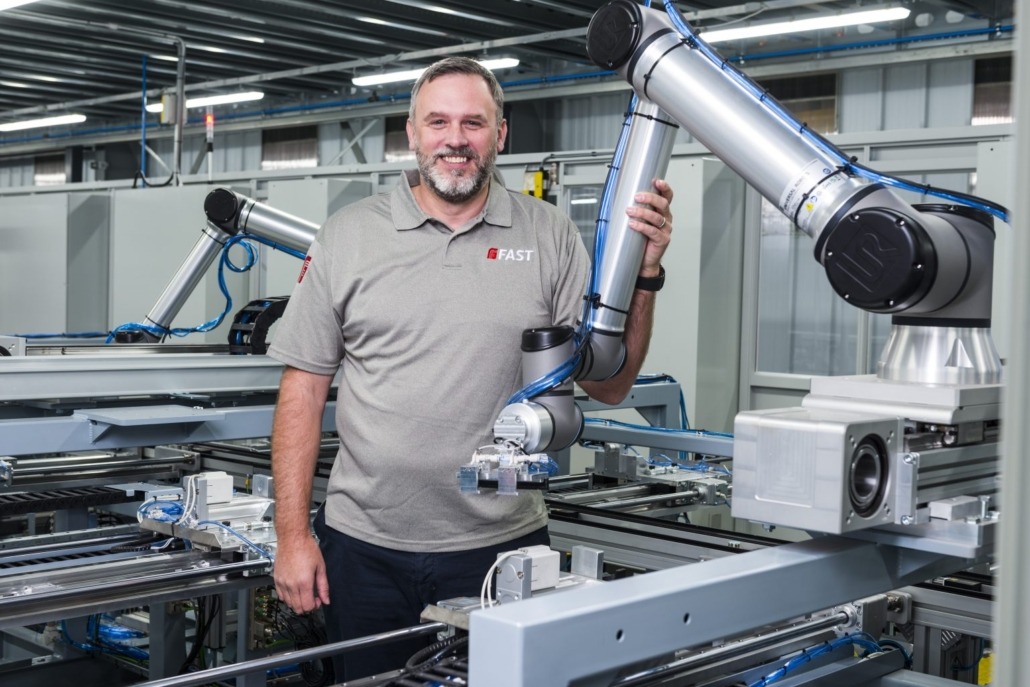
Londonderry/Derry based FAST Technologies has secured a multi-million-pound contract with the USA production site of Bloc Blinds.
The contract will see the integration of FAST’s advanced manufacturing technologies, incorporated into ‘Dreamaker’ at Bloc Blinds’ production facility in the US, transforming and streamlining the customisation and manufacturing of window blinds.
It will enable Bloc to dramatically scale up the production process and offer a 24-hour fulfilment time to customers across North America. The investment in FAST’s ground-breaking technologies reflects escalating demand for Bloc’s customised window blinds.
With a strong focus on intelligent manufacturing systems, FAST is at the forefront of revolutionising production processes across a wide range of sectors, through seamless implementation of automation technologies. By integrating advanced robotics, machine learning, and real-time data analytics, its ‘Dreamaker’ system enhances precision, reduces repetitive tasks, and maximises efficiency at every stage of production. This technology can empower workforces, enabling employees to focus on the more skilled and value-added tasks.
Speaking about the contract, Colin Spence, Technical Commercial Director from FAST, said:
“What sets FAST apart is our ability to push the boundaries of what is possible in industrial automation. Our solutions not only improve speed and scalability but also enables an end-to-end quality control, even across high-volume orders. This contract highlights FAST’s reputation for delivering advanced automation technologies that can adapt according to their customers’ needs.
“We believe this is a groundbreaking advancement in automation for the North American market and we are extremely proud to be part of this progressive partnership. FAST has over 25 years’ experience in industrial automation, allowing us to provide best in class automation solutions to industry leaders. As an advanced manufacturing company, our team have expertise specialising in automation, robotics and software solutions for companies worldwide.”
FAST is well-positioned to secure additional high-profile contracts and deliver on ambitious growth plans as its customer base has grown significantly in recent years, coinciding with the launch of their A2Hub, located in Catalyst Innovation Centre, Derry. This automation accelerator hub is an innovative space, whereby FAST can collaborate with companies on their digital transformation journey, developing and implementing custom solutions, unique to their business operations, which in turn supports sustainable business growth.
Cormac Diamond, Bloc Managing Director added: “Our facility is pioneering the production process, and this will be enhanced thanks to the innovative robotic systems and automated technologies delivered by the experts at FAST. We’re now best equipped to meet growing customer demand, drive efficiencies and manage issues such as labour shortage and spiralling energy costs which are common to all manufacturers today.”
Alchemy Technology Services, a leading software implementation and consultancy firm in the global insurance technology industry, has been announced as the first tenant of the new Ebrington Plaza building in Derry/Londonderry. This move is part of a multi-million pound investment in the North West region by Alchemy, signalling its ongoing commitment to the local economy.
The state-of-the-art, grade A office space in Ebrington Plaza will serve as Alchemy’s new permanent headquarters, supporting the company’s commitment to long term growth in the region. Founded in the city in 2018, Alchemy currently employs over 150 people in Derry/Londonderry, providing consultancy and software implementation services to the global insurance industry.
John Harkin, Founder and CEO of Alchemy Technology Services, expressed his enthusiasm for the move: “We are thrilled to be the first tenant in Ebrington Plaza. This new cutting-edge office space will allow us to continue our expansion and to create an exceptional work environment for our employees. The move supports our mission to create a centre of excellence for the transformation of the global insurance industry by attracting and retaining top talent in the North West. It reinforces Alchemy’s position both as a leading player in the global insurance industry and an employer of choice in Northern Ireland.
Harkin added, “Following the recent opening of our City of London office in the iconic Lloyd’s of London building, we’re confident our new headquarters will play a pivotal role in continuing to expand our customer base. It’s a testament to our development as a company over the past 6 years and to the hard work and dedication of our talent.”
Jeremy Fitch, Executive Director of Business Growth at Invest Northern Ireland said:“Invest NI has proudly supported Alchemy since it first established a presence in Northern Ireland in 2018, helping the company grow and create high-quality jobs.
“Today’s announcement reflects Alchemy’s confidence in the North West’s skilled talent pool. Companies like Alchemy play a vital role in strengthening our regional economy and reinforcing Northern Ireland’s reputation as a prime destination for business and investment.”
Paul Mulholland, Heron Group Property Director, commented ‘We are delighted to welcome Alchemy, a thriving local technology business, to Ebrington Plaza. Alchemy’s decision to choose Ebrington Plaza is testament to the quality of space on offer and the appeal of Ebrington as a business location. Alchemy has established itself as a leading player in its field and Heron Property are excited to deliver best-in-class office accommodation for their growing business.’
Mayor of Derry City and Strabane District Council, Councillor Lilian Seenoi -Barr, added
“Best wishes to all at Alchemy Technologies for this exciting new chapter in their journey.
“It represents another significant milestone for the firm who have expanded significantly since they were founded in 2018.
“Their decision to locate their headquarters in the heart of the city is a ringing endorsement of the North West as an attractive location to work, live and do business in.”
The move to Ebrington Plaza in spring 2025 marks a new chapter for Alchemy Technology Services as it continues to grow its presence in Northern Ireland and expand its services to the global insurance industry.
About Alchemy Technology Services
Alchemy Technology Services is a software implementation and consultancy firm driving the digitisation of the global insurance industry. Alchemy was founded in Derry/Londonderry in 2018 by John Harkin with a mission to create a centre of excellence that would offer world class careers for the talent of the North West. It currently employs 200 people in both Derry/Londonderry and in its London operation, Alchemy London Market, based in Lloyd’s of London.
About Ebrington Plaza
Ebrington Plaza is a new, multi-million pound development in Derry/Londonderry, offering grade A office space designed to attract and support businesses in the North West region of Northern Ireland. The development is set to play a crucial role in the area’s economic regeneration and growth.
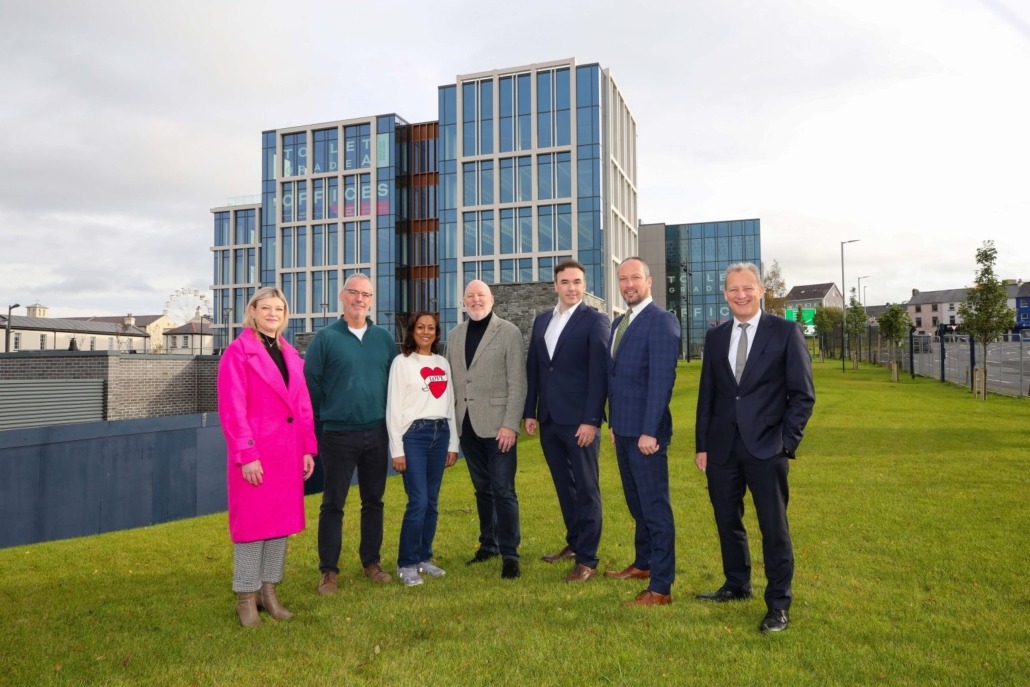
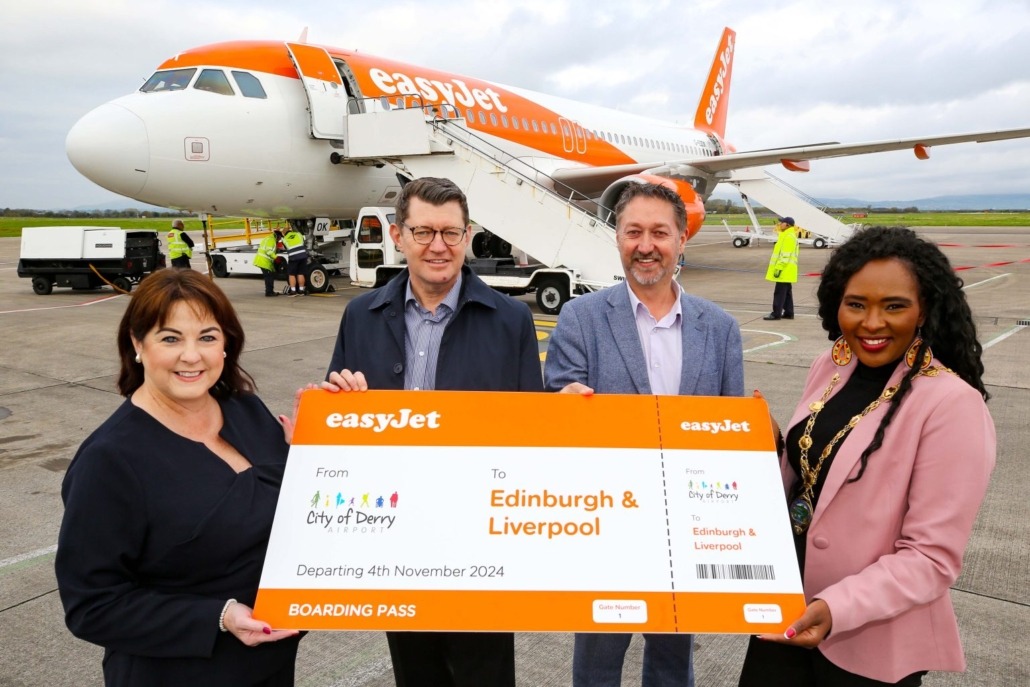
On 4th November easyJet, Northern Ireland’s largest airline, has launched the first flights on two new domestic routes from City of Derry Airport to Liverpool and Edinburgh.
The new twice-weekly services – providing customers in Northern Ireland even more convenient connections across the UK – took off for the first time today with both routes operating every Monday and Friday throughout the year.
To mark the occasion, the Airport surprised the inaugural departure and arrival passengers with an easyJet orange celebration where they were treated to complimentary drinks, refreshments and giveaways before setting off.
Special guests, the Mayor Derry City & Strabane District Council, Cllr Lilian Seenoi-Barr, Chief Executive at Visit Derry, Odhran Dunne, President of Derry Chamber of Commerce, Greg McCann, President of Causeway Chamber of Commerce, James Kilgore, and Chief Executive of Letterkenny Chamber of Commerce, Toni Forrester, joined the celebrations.
The new routes provide stronger domestic connectivity and serve increasing demand for flights between Northern Ireland and key cities across the UK.
Both Edinburgh and Liverpool are known for their rich history and wide range of cultural attractions, including museums, art galleries, theatres, and music venues. Edinburgh is famous for its festivals, while Liverpool is known for its music scene, particularly The Beatles.
Whether customers are looking for a city break, to visit friends and family, need a convenient business connection, or are connecting to onward destinations across Europe and beyond, easyJet offers great value fares and flights for business and leisure travellers alike.
Ali Gayward, easyJet’s UK Country Manager, said:
“We are thrilled to be celebrating the launch of our year-round operations from City of Derry Airport to Liverpool and Edinburgh today, and to be providing even more choice for our business and leisure customers alike.
“We are proud to be the largest airline in Northern Ireland offering great value fares and convenient connections for our customers here as, well as those across the UK looking to explore the fantastic experiences Northern Ireland has to offer.”
Steve Frazer, Managing Director at City of Derry Airport stated:
“This is a special day for City of Derry Airport as easyJet takes off from the Northwest for the first time. This is a day that should be celebrated for the entire Northwest region. easyJet brings an undeniable level of brand credibility, customer confidence, not to mention great value fares for travellers across our catchment area.
“We are very pleased for the return of connectivity to Edinburgh and Liverpool for our local region as year-round services to these destinations have been in demand from both corporate and leisure travellers for some time, and the flight schedule for Monday’s and Friday’s offers ideal timings for business travel during the week and weekend breaks for the leisure market.
“The launch of easyJet services will be an additional economic driver for business investment in the Northwest and inbound travel and tourism, we are proud to be able to help grow and develop these sectors in our local area.”
easyJet is the largest airline in Northern Ireland, offering over 45 routes across Europe and North Africa.
Great value seats are available to book from £14.99* on easyJet.com and via the mobile app. To discover more about easyJet’s Northern Ireland network and to book, visit easyJet.com.

Ulster University has been awarded ‘University of the Year 2024’, the most prestigious title of all by Times Higher Education. For the first time in the University’s history, Ulster University is recognised as the top higher education institution in the UK and Ireland.
Known as the Oscars of the UK university sector, the Times Higher Education annual awards celebrate the best of higher education in the UK and Ireland. The University of the Year accolade honours exceptional university performance, with this year’s award reflecting achievements during the 2022-23 academic year.
In September, Ulster University was shortlisted alongside five other top-ranking institutions: London Metropolitan University, University of Stirling, University of Leicester, University of Sunderland, and University of Surrey. The awards attract hundreds of entries each year from universities across all corners of the UK and Ireland, that exemplify the talent, innovation, and commitment of individuals and teams across all aspects of university life.
What the judges said
Ulster University was hailed as a “force for good in fostering peace, prosperity and cohesion” and took the top spot in recognition of its role as an anchor institution in a region that has undergone rapid change in the quarter-century since the signing of the Good Friday Agreement.
The award honoured the completion of Ulster’s £364 million Belfast campus, creating a vital connection to a historically underserved community, backed up with a schools programme designed to boost higher education participation among the city’s young males.
The judges were also impressed by the securing of a €44.5 million (£37 million) investment from the Irish government for the development of Ulster’s Derry/Londonderry campus, making it a groundbreaking cross-jurisdictional project.
The significance of such efforts to ongoing peace and collaboration were underscored by Ulster’s role as host to the US president, Joe Biden, on his visit to mark the Good Friday Agreement’s 25th anniversary.
The judges said these achievements “demonstrated the university’s growing influence and status in the island of Ireland, and as a force for good in fostering peace, prosperity and cohesion”.
2023: A momentous year for Ulster University
The top accolade recognises Ulster University for its ‘People, Place and Partnership’ strategy, which recommitted to maintaining a dual focus on research and teaching while driving social mobility and economic growth. The university’s commitment to putting the student experience at the heart, led to achieving its highest rank in the history of UK domestic tables.
In what was a momentous year, the university secured a multi-million-pound Shared Island investment in a new teaching and student services building in Derry~Londonderry, which is set to expand an already thriving hub for health sciences, interdisciplinary training and practice in the North West. The campus is preparing to graduate the first cohort of doctors from the Graduate Entry School of Medicine next year and offers the first Paramedic Science course in Northern Ireland meaning that Ulster University’s Derry~Londonderry campus provides the most comprehensive higher education healthcare offering in the UK and Ireland.
Additionally, the University marked the completion of its new state-of-the-art Belfast city centre campus, one of the largest higher education capital projects in Europe, recently named Building of the Year by the Royal Society of Ulster Architects. A beacon of aspiration and an engine of innovation, the campus is transforming learning and teaching experiences while making a significant economic impact in the immediate area, across the city, and the wider region.
With a unique multi-campus model, Ulster University is also delivering on its ambition for an innovative drug discovery centre in Coleraine to complement the existing Biomedical Science and Pharmacology offering. An expansive, semi-rural facility based on the north coast, the Coleraine campus is home to new programmes such as Adventure Sports and Golf Management alongside Arts, Humanities and Education.
Marking the 25th Anniversary of the Belfast Good Friday Agreement
In the year of the 25th anniversary of the Belfast Good Friday Agreement the institution launched a one-of-its kind leadership programme, 25@25 which helped 25 graduates develop their full leadership potential. Ulster University’s vital role in Northern Ireland’s journey from peace to prosperity over the last 25 years was acknowledged by the President of the United States of America when he selected the University as his only visit to the UK in April 2023 to mark the milestone.
Alongside the achievements of 2022/23, the institution continued to operate with the student experience at its heart, achieving its highest rank in the history of UK domestic tables.
Ulster University Vice-Chancellor Professor Paul Bartholomew said:
“We are incredibly proud and delighted to be announced as University of the Year by Times Higher Education. These prestigious awards attract hundreds of entries from top institutions across the UK and Ireland, and this recognition reflects the hard work of our staff and the support of our student community across our campuses.
“I truly believe that Ulster University is an extraordinary organisation in every sense of the word, and in recent years we really began to realise our full potential. Ulster University is a research-led, people centric, community-focused and values driven institution that believes in equality, celebrates diversity and fosters inclusion.
“Today, we are a University of and for the world, attracting the attention of presidents, politicians and changemakers.
“As a multi-campus University uniquely positioned in Northern Ireland, we play a pivotal role in driving forward economic prosperity and growth that creates opportunities and improves the quality of lives across the whole of our shared region.
“Our People, Place and Partnership strategy capitalises on that and emphasises our dual focus on research and teaching while driving social mobility. We demonstrate the belief that though we inherit our past, we chose our future, and it is our mission to ensure that all of our students have all the skills they need to make a difference in the world.”
Ulster University was previously shortlisted for University of the Year in 2021 by The Times and Sunday Times Good University Guide. In June 2024, the University was recognised as the highest-ranking UK university for outreach activities, and fifth in the world overall, in the Times Higher Education Impact Rankings 2024.
This year marked the 20th anniversary of THE Awards celebrated at a glittering gala ball held at the International Convention Centre in Birmingham on Thursday, 28 November. Ulster University’s recognition as University of the Year was one of 19 categories celebrated on the night
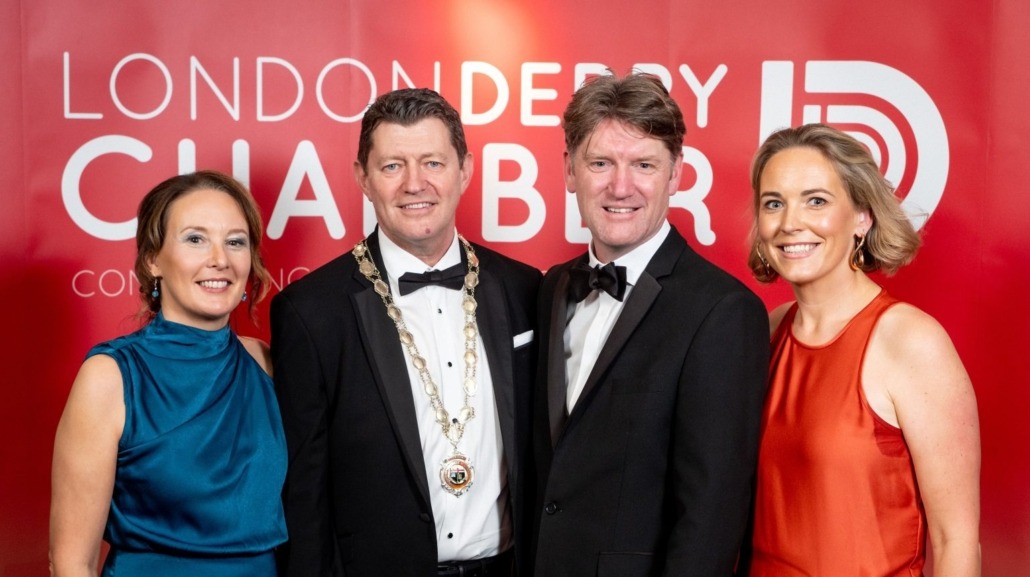
On 6th December Derry Chamber helds its AGM and officially welcomed its new Chamber President, Andrew Fleming.
Andrew is Chief Executive of FNW Group, the parent company of Fleming Steel, Fleming Doors and Fleming Coatings, based in Donegal; Norwest Roofing Systems in Omagh; Limavady Roller Doors in Limavady; and BES Solutions in Belfast. As a major player in the North West economy and Vice-President of the Chamber this year, Andrew will be a familiar face to many in the Chamber.
Speaking ahead of the AGM, Andrew said:
“The North West City Region is brimming with potential just waiting to be unlocked. After so many decades of missed opportunities and policies, now, amid the numerous plans and investments announced by the Executive for our region, is our time to drive through the positive change and progression the North West both needs and deserves.”
“I would also like to thank Greg for his outstanding leadership and commitment, and I look forward to working with the Chamber team over the next year to champion the North West region.”
Andrew will be supported in his role by Steven Lindsay as Vice President as well as the Chamber Board, to which we are delighted to welcome two new members, William McColgan and Clare McGee.
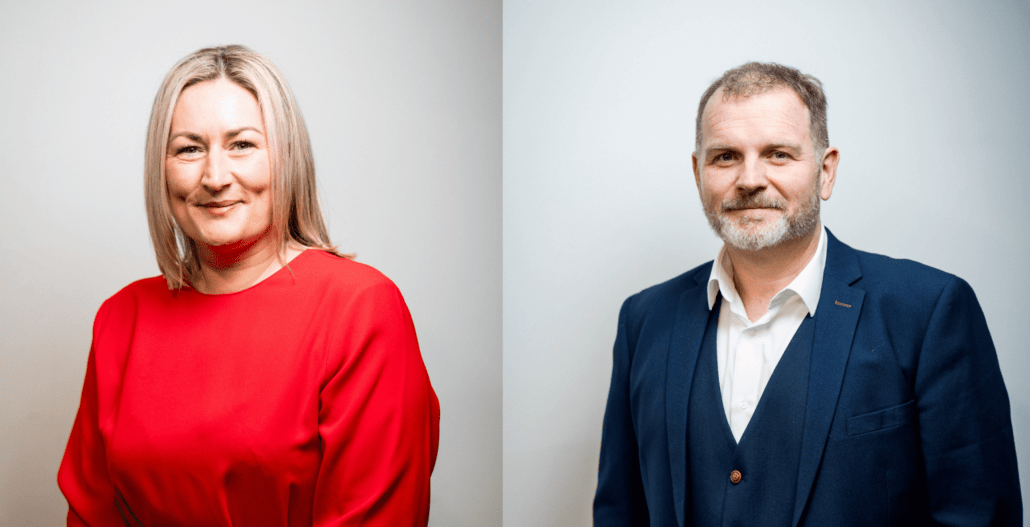
William co-owns and operates McColgan’s Quality Foods, a third-generation family business in Strabane, alongside his sister. He began his career in financial services, working as an actuarial consultant with Mercer in Dublin, Stuttgart, Frankfurt, and Philadelphia. Over the years, William has held director roles at Liberty Mutual and Manulife and successfully scaled an EdTech start-up originating from Princeton University.
Clare McGee is the dynamic CEO of AwakenHub/ AwakenAngels, with over 20 years of expertise in innovation, mentoring, project management, and funding, particularly within the tech and creative industries. As the co-founder and CEO of AwakenHub/AwakenAngels, Clare spearheads initiatives to empower women entrepreneurs and investors, reshaping the startup landscape across Ireland. Her strategic leadership is also evident in her work with Innovate-NI, where she champions sustainability and entrepreneurship within local businesses. Renowned for her operational expertise and dedication to nurturing entrepreneurial talent, Clare is a trusted advisor to both startups and investors. Recognised as the Northern Ireland Business Personality of the Year in 2016, she remains a pivotal force in advancing Ireland’s entrepreneurial ecosystem.
Andrew’s appointment sadly brings an end to the brilliant Greg McCann’s Presidency. Greg remained a strong voice for the Chamber and North West throughout his presidency, and we thank him for the dedication and commitment he has shown to the Chamber.
.
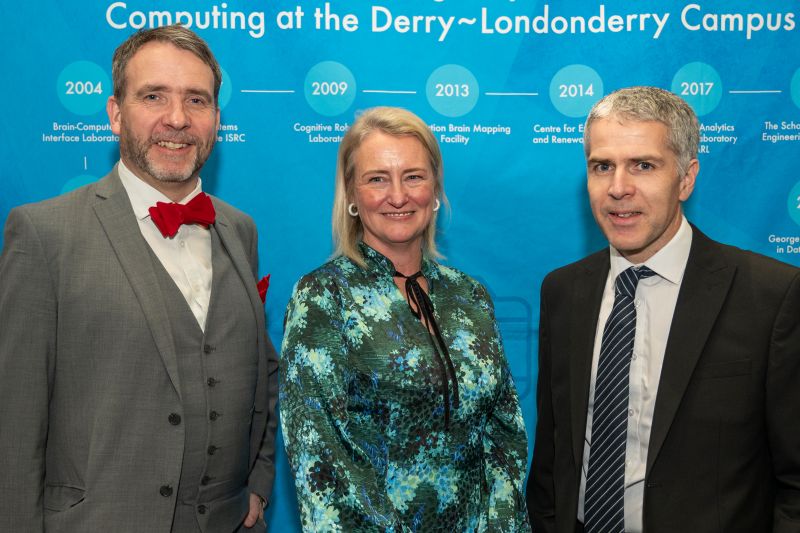
Ulster University has brought together students, faculty, industry experts, and members of the local community to mark the milestone of 40 years of computing at its Derry~Londonderry campus.
In an anniversary celebration on 20 November, the School of Computing brought together stakeholders to explore current innovations and imagine what the future may hold for computing and wider society.
The day featured a Pitch and Judge competition for secondary school students across the North West who were challenged to ‘Envisage 2064’ and imagine what computing may look like, and how it will change society, 40 years from now.
With participation from over 60 students, the young people explored future transformative changes in technology, society, and sustainability through computing, before presenting for a panel of judges.
After four decades innovating from the heart of Derry~Londonderry, the School of Computing also opened the doors to the Intelligent Systems Research Centre for public tours that provided a glimpse into Ulster University’s ongoing projects and future aspirations, underscoring the University’s commitment to advancing technological innovation and contributing to breakthroughs that impact industries, healthcare, and daily life.
The event concluded with a public lecture by Professor Michaela Black, Professor of Artificial Intelligence at Ulster University, on ‘Demystifying the Hype of AI’.
Professor Black shared insights on AI’s trajectory, its societal impact and what the future holds in this exciting field, unpacking the often-misunderstood aspects of artificial intelligence, examining its societal impact, ethical implications, and the potential challenges and breakthroughs we may see in the years to come.
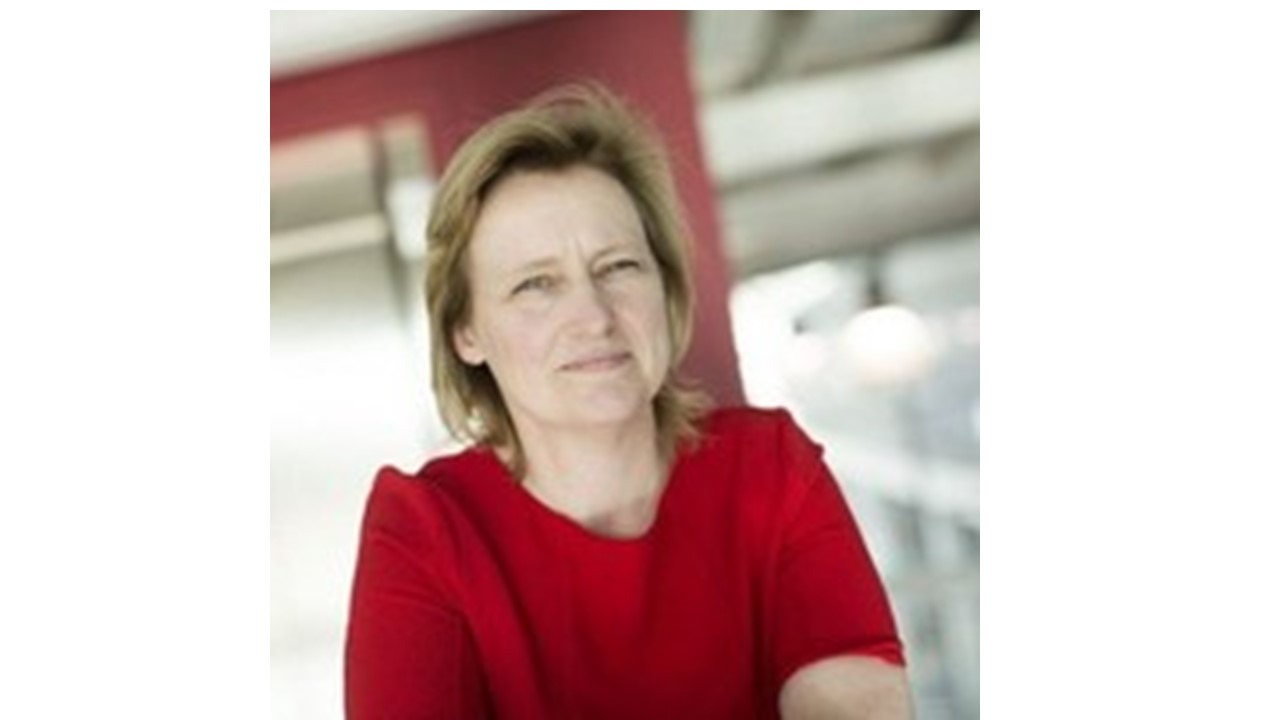
Ulster University is working to foster greater AI adoption in business through the Artificial Intelligence Collaboration Centre (AICC), a project based across Belfast and Derry~Londonderry and delivered in partnership with Queen’s University Belfast.
Launched as part of a £16.3 million investment by Invest Northern Ireland and the Department for the Economy in March 2024, the AICC is dedicated to advancing AI awareness and adoption among businesses in Northern Ireland, with a focus on ethical and responsible innovation.
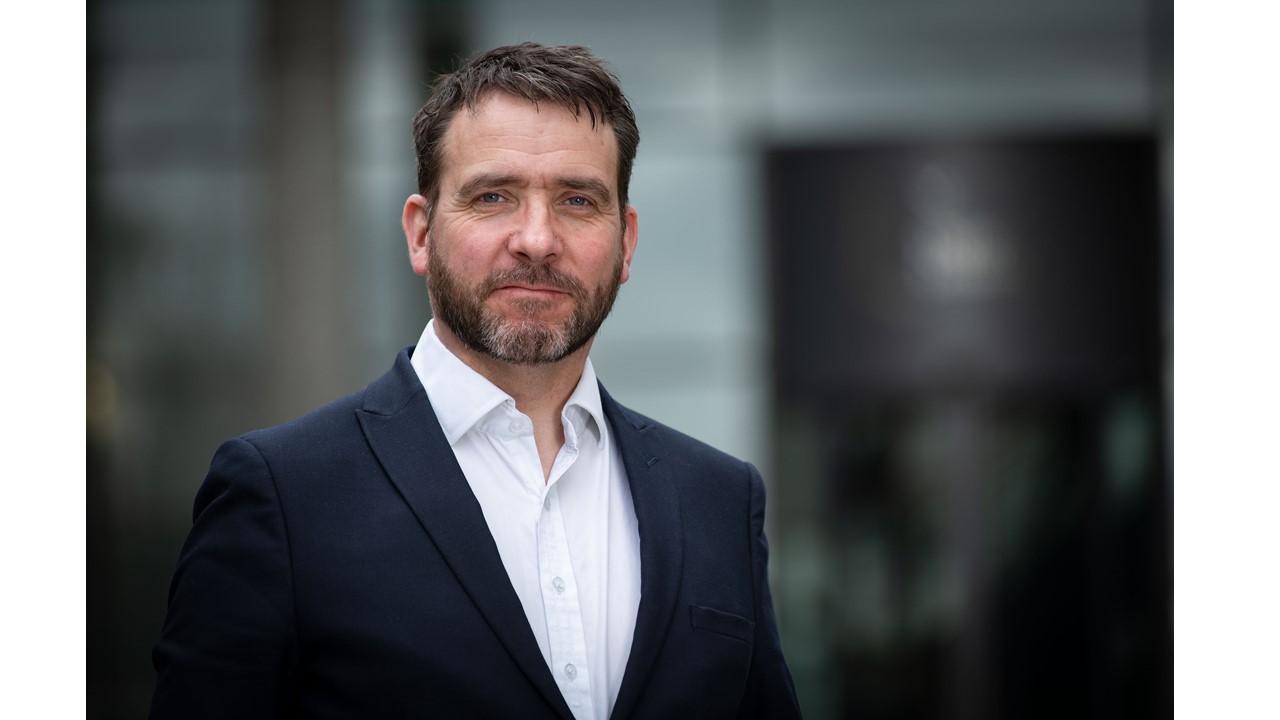
Whether you’re planning a special evening out with loved ones, or just need a pit stop during the Christmas shopping, here are some exciting new eateries in Derry and Strabane for you to try this festive season.
Stitch & Weave
Gift yourself stunning views at this new bar and restaurant on Ebrington Square, overlooking Derry’s River Foyle and Peace Bridge.
Enjoy seasonal dishes with local produce, treat your friends to a Prosecco ‘tower’, or order a warming glass of the restaurant’s own newly-launched whiskey, Cask 1782.
Clipper Quay Street Food Market
Does your Christmas crew struggle to agree on what kind of food they’re after? Avoid a festive fallout and head to this bustling Derry street food market, where there’s something to suit everyone’s tastes.
Think juicy smash burgers from Notorious Street Food, giant New York-style pizza slices from Cugino’s, and delicious sweet crepes from Scoops Ahoy, all with views of the River Foyle.
Social Studio
As the name suggests, the atmosphere is as good as the food in this lively restaurant in Derry’s Cathedral Quarter.
Fuel up ahead of some present shopping with the Brunchin’ and Lunchin’ daytime menu, or make an evening of it with dinner and drinks from the extensive cocktail menu.
Café Central
When you purchase coffee, cake or lunch from this Bishop Street café, the money you spend will help women and families supported by its parent charity, Foyle Women’s Aid.
There are some delicious Christmas specials on the menu, and don’t forget to pick up a loyalty card – with the lovely atmosphere, great service and delicious food, you’re sure to be back again.
The Thirsty Filly
This cute and cosy café, located at the Old Schoolhouse in Strabane, serves hot drinks, homebakes and an epic festive toastie with all the trimmings, on Scarpello sourdough.
Left your Christmas shopping to the last minute? There are New Kid coffee beans, reusable cups and cafetieres on sale too – the perfect gift for any coffee aficionado.
The Banks Restaurant
Also in Strabane is award-winning restaurant The Banks, overlooking the banks of the River Mourne. Enjoy the view as you tuck into lunch or dinner with locally sourced, seasonal dishes.
You can even treat yourself to an overnight stay at The Banks, in one of the tastefully decorated en-suite bedrooms above the restaurant.
Castle Bistro
From its new home in Derry’s Craft Village, the Castle Bistro serves up brunch, dinner and cocktails, plus some lip-smacking vegan options.
There are paintings by local artists on the walls, local ingredients on your plate, and local spirits and beers on the drinks menu too.
Oui Bakery
You’ll often find a queue outside Oui Bakery, also in the Craft Village – and once you’ve tried its beautiful bakes, it’s easy to see why.
Parisian chef Laurent Pirone pours decades of expertise into his creations – which include almond croissants, pains au chocolat, sourdough loaves and the seriously indulgent white chocolate and pistachio spiral rolls.
Treat your loved ones – and yourself – to a ‘oui’ treat this Christmas!
If that’s got you in the mood to try out some more of the fantastic restaurants and cafes in the North West, the entire month of February is dedicated to showcasing the LegenDerry food and drink on offer locally.
During Love LegenDerry Food Month, a variety of events and experiences will be held across Derry and Strabane to promote the region’s outstanding food and drink, and the people who produce it.
The programme includes a range of unique events created by food producers and chefs to showcase the high-quality produce that can be found throughout the region including a Dart Mountain Cheese tour and taste experience which will take you into the heart of the Sperrins to visit Derry’s award-winning artisan cheese producer, the Oyster and Stout Festival celebrating the Lough Foyle Native Oyster, and the launch of the city’s newest food tour, Derry By Fork.
For more information on Love LegenDerry, visit www.legenderryfood.com/events
The Derry-Londonderry and Strabane City Region City Deal has celebrated a major milestone with the signing of a Financial Deal to unlock more than £290 million of investment in health, life science and digital projects and bring transformational change to the region.
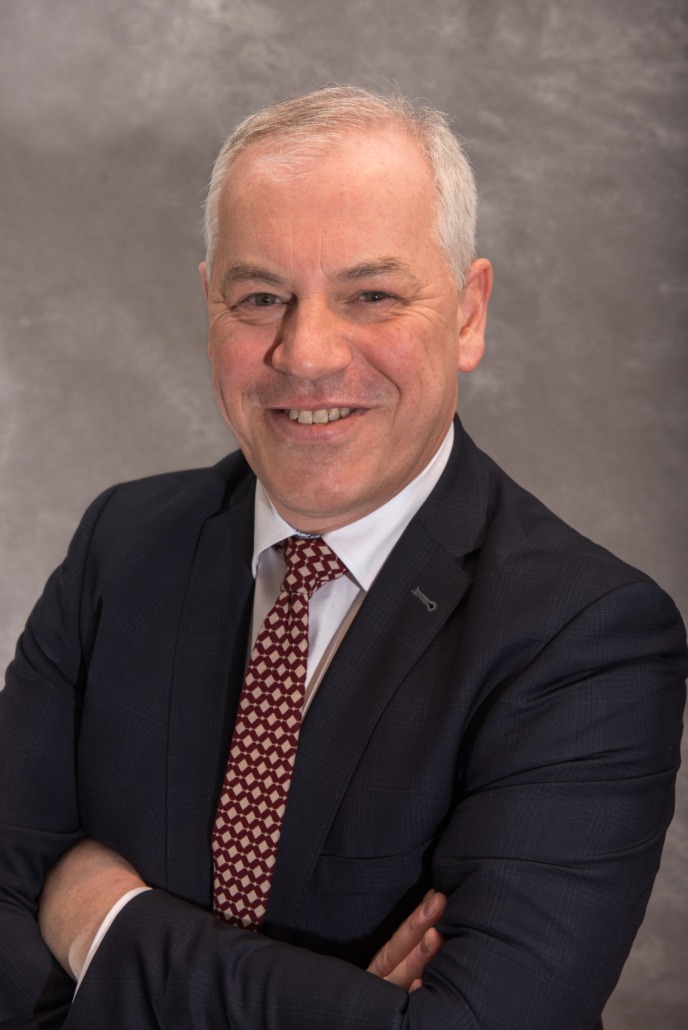
Derry City and Strabane District Council Chief Executive John Kelpie explains the key benefits of the City Deal, and what it could mean to people hoping to return to the North West.
Congratulations on the signing of the Financial Deal. How will the City Deal change people’s day-to-day lives in the Derry City and Strabane region?
The Derry City and Strabane City Deal will improve people’s quality of life by creating more job opportunities, a safer, more vibrant city and town centre, and a focus on education and skills. It has the potential to bring up to 6,300 jobs by 2033 and lever additional millions in investment over the next decade. We aim to increase our output growth with a GVA (gross value added) of £230m per annum, which should see a significant rise in wages. People can expect to see real growth in sectors such as health and life sciences, digital industries and SMART technology that will support economic investment and regeneration, and also boost tourism and culture.
As someone who has been working on the City Deal since its inception, what aspect of the deal are you most proud of?
This is a once in a generation deal; its impact will be felt by the people of the city and district for many years to come. Personally, I’m proud of the collaboration between all the key partners who worked tirelessly to get it across the line. It’s been a joined-up approach which has seen us harness collective resources, expertise and passion for the North West. The investment from the UK government and NI Executive, plus the input from all the delivery partners, allows us to leverage additional private sector investment and make a real, positive difference to local people’s lives.
What type of jobs will be created?
We anticipate jobs will be created across all City Deal projects – including Smart Cities and digital enabling infrastructure, the School of Medicine and C-TRIC expansion, Strabane town centre’s regeneration, the Derry riverfront regeneration, Walled City tourism and the DNA (Derry North Atlantic) Museum in Ebrington.
Sustainability, inclusivity and employability are crucial and partners are already working to create a skills pipeline for the employment opportunities created by the City Deal – helping people upskill, reskill and boost digital skills.
The investment will also boost confidence and stimulate additional private sector activity and jobs. We anticipate an overall increase of 12% in the labour market, with large increases in areas such as healthcare and tourism.
What benefits will the City Deal bring for potential investors?
The North West is already an attractive proposition for investors, thanks to our unique cross-border location, our talented, well-educated workforce, and our fantastic quality of life. The City Deal, with its emphasis on innovation, digital infrastructure and regeneration will transform our local economy, and make the city and district an even greater place to do business.
What are the next steps for the City Deal?
The official signing of the Financial Deal means Council and its delivery partners can now access funding to progress to the next stage of delivering the projects, once the full business cases are approved. The next phase of the City Deal will focus on detailed design and delivery. This work will include a wider awareness and engagement process, as the designs are developed.
What message would you have for anyone looking to return or relocate to the North West?
If you grew up here, or are considering a move here, you’ll already know that there’s nowhere quite like the North West. Our location, the friendliness of our people and our rich cultural heritage are second to none. There’s an energy and excitement here, and economic growth in recent years means we are already seeing diaspora return to live, work and raise their families. The City Deal will supercharge that prosperity, innovation and regeneration. There’s never been a better time to come home. I would encourage anyone considering relocation to visit investderrystrabane.com and sign up to the Derry Strabane Global newsletter for job and investment updates, and help planning their move.
When will City Deal projects be visible on the ground?
The pledge by the UK and NI Governments with the signing of the Financial Deal allows us to progress to the delivery phase of the projects, which will be on a phased approach over the next 10 years. The first visible project will be the DNA Museum being on site by early 2025 and the Museum opening in late 2026. All of the projects are at different stages of delivery, and these will be implemented in phases. With the financial deal in place, we will now be moving at pace to bring the other projects such as the Strabane Strategic Leisure project, a key element of the Strabane Regeneration, to the next stage of delivery. There will also be a focus on creating designs and drawings ahead of engagement with the public and partners.
What legacy do you hope the City Deal will leave for future generations?
With its focus on sustainable growth and lasting change, the positive impacts of the City Deal will be felt for generations to come – from health and wellbeing, to job prospects and economic prosperity. It’s about fulfilling Derry City and Strabane’s potential as a thriving, prosperous and inclusive region for all its inhabitants.
Where can the public find out more and be kept informed about progress?
People can visit www.derrystrabane.com/citydeal and keep an eye on Derry City and Strabane District Council’s social media channel for updates.

Derry entrepreneur Jennifer Neff co-founded social prescribing start-up Elemental, now Access Elemental, in 2013. The company supports over 20 million people across the UK, Ireland and Australia, helping them access personalised support and care in their own communities, and tackling health inequalities. Jennifer, who was recently awarded the Society Award at this year’s TechUK President’s Awards, shares her story, and her advice for people considering a relocation or investment in the North West.
“Winning the TechUK President’s Award was of those pinch me moments. The competition was high, so I was under no illusion that it would be an easy win. When they called out my name in the packed conference hall in central London, full of the UK’s leading tech companies and Thought Leaders, I put my head in my hands and sat still in total disbelief as everyone cheered. I asked myself, ‘Has a non-technical co-founder just won overall tech UK President’s Award for Society?’, and the answer was ‘Hell, yes!’
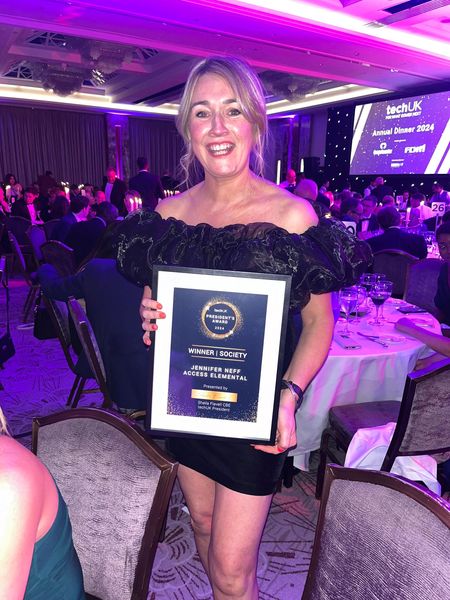
It is one of my career highlights to date and is great for women in tech, tech for good and for Derry! Any chance I get to talk about Derry and how wonderful Derry is and Derry people are, I am in there.
When I co-founded Elemental with Leeann Monk-Ӧzgül in 2013, we took the story of Derry to every city, town and village we could (even Dubai) and talked about what was so great about Derry, but also how we were tackling health inequalities here, to help others tackle the avoidable issues affecting their localities. As a result, we were invited to participate in the regeneration and improvement of other places and spaces. The Access Elemental platform was created and implemented across communities so people could get more personalised support and care to improve their health and wellbeing in their own communities.
Leeann and myself always had total belief in what we were doing and why we were doing it – I think that is part of being a Derry Girl, and the strong generations of Derry Women down the years. We surrounded ourselves with the best mentors and the best people we could find in the region, and learned from them.
We were bought out by the UK’s largest UK-based tech company, The Access Group, in August 2021, five years after we first launched Elemental Software. There’s been lots more investment in the team and the Elemental product which has enabled us to expand into Australia and develop new products across the NHS and local Councils throughout the UK. Over 20 million people are now engaging in services such as debt advice, mental health support, physical activity and befriending support via Access Elemental. We’ve developed a unique marketplace product, Access Elemental Marketplace, that community and voluntary groups and services feature on and receive referrals via that is accessible by commissioners, clinical leads and community leaders. It’s been rolled out across cities as we speak.
I would say to everyone living/working, or considering returning to the region, to think about starting their own business. We’re a resilient, creative and caring bunch of people here in Derry and Strabane; all the right qualities for starting and growing successful businesses. There are lots of opportunities and support here from me and others. The FEED programme for example – funded by NatWest and based at The Amp, Ebrington Square – is one of many programmes available to help people spark ideas and take their ideas to the next level.
I was also asked to be the Entrepreneur in Residence, one of three experienced mentors, and the only female mentor, in the Founder Labs, an accelerator programme to support early-stage innovation businesses in Northern Ireland. We’re keen to get as much representation from the North West as possible. The next cohort of participants will be starting the programme in mid-November.
There’s something very special happening here right now with high growth start-ups. Having received angel funding over the years for Access Elemental, I have now become an investor myself and made my first investment recently in a Derry-based start-up. It makes all the difference to the company, job creation opportunities and building the social and economic potential of the region. I would encourage other firms and individuals to invest in Derry and Strabane-based businesses.
The business landscape is changing here. It’s not just about the accountants, solicitors and insurance companies anymore. We have animation, gaming, renewable energy, creative, tech for good and clothing brands operating on an international level, all based in Derry and Strabane. There are more women, young people and ethnic minority groups taking the step into entrepreneurship than ever.
Having lived abroad in Edinburgh, Manchester and the United Arab Emirates, I feel so fortunate to be home. I can walk to work, my kids walk to school, cold-water dip and surf within a 20-minute drive. I get to give back and mentor others coming through social entrepreneurship journeys and I can be in London, Manchester and Birmingham for meetings within 90 minutes.
And I’m able to pop into see my mum and dad for a cup of tea and a chocolate biscuit; you can’t put a price on that.”
